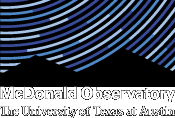McDonald Observatory Receives $190,000 NASA Grant; Will Train Texas Elementary, Middle School Teachers in Science Education
7 February 2008
AUSTIN, Texas —The University of Texas at Austin McDonald Observatory has been awarded a grant of about $190,000 from NASA to train teachers across the state in science education. The project will develop, test and implement professional development workshops for 500 Texas teachers of grades 3-8 that will be delivered via videoconference.
In Texas, students are tested on science in the fifth, eighth and 10th grades. This training program will specifically address questions that Texas students score low on in the fifth-grade standardized test (the Texas Assessment of Knowledge and Skills).
McDonald Observatory is partnering with the Texas Regional Collaboratives for Excellence in Science and Mathematics Teaching in this project, and that group is contributing funding for the state-wide effort as well. Additional monies will come from McDonald Observatory’s Cynthia and George Mitchell Foundation Education Endowment. Altogether, the two-year project will cost about $250,000.
The training program will meet a pressing demand. McDonald Observatory has hosted professional development workshops for teachers at its West Texas mountaintop site since 2002. Today, applications far exceed the number of available spots for teachers. And many more teachers may not apply, due to the Observatory’s remote location. But in a state the size of New England, New York, Pennsylvania, Ohio and Indiana combined, it’s not always easy for the Observatory to come to them.
In recent years, the Observatory has piloted a teacher training program that solves that problem using videoconferencing. This new NASA grant will enable the Observatory and its partner, the Texas Regional Collaboratives, to make these videoconference training sessions available to teachers across the state.
In the first year, representatives from regions across Texas will attend a three-day, two-night workshop at McDonald Observatory in Fort Davis. They will work with the Observatory’s kindergarten-to-12th grade education team to design a teacher training videoconference for their region. In the second year, the videoconferences will be tested and implemented.
— END —





